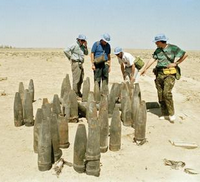On Feb. 12, Iraq became the latest country to join the Chemical Weapons Convention. The country's entry was especially important in light of the widespread use of chemical weapons by former Iraqi dictator Saddam Hussein against his foreign and domestic enemies. Under Hussein, Iraq developed a major chemical weapons industry. During the 1980s, the regime killed thousands of people by repeatedly employing chemical weapons against both Iranian troops during the 1980-88 Iraq-Iran War and its domestic opponents, most infamously in the March 1988 mustard gas attacks on the Kurdish village of Halabja. With Iraq's entry, the CWC (as the Convention on the Prohibition of the Development, Production, Stockpiling and Use of Chemical Weapons and on their Destruction is commonly known) now has 186 State Parties, leaving only nine states as non-members. This is a remarkable achievement and a reflection of the convention's unprecedented membership growth for a major disarmament treaty. The 186 countries that have acceded to the treaty represent 98 percent of the world's population, landmass, and global chemical industry. Yet, getting the remaining nine states to enter will prove extraordinarily challenging. The governments of the Bahamas, the Dominican Republic, Israel, and Myanmar have signed but not ratified the treaty (and are referred to as "Signatory States"). Angola, Egypt, North Korea, Somalia and Syria have never signed the agreement (giving them the status of "Non-Signatory States").
Global Insights: Iraq Move Highlights Progress, Obstacles for Chemical Weapons Disarmament

